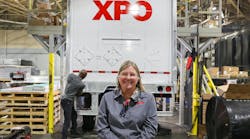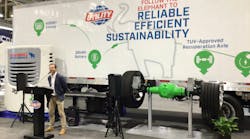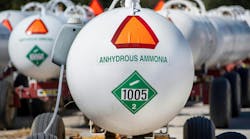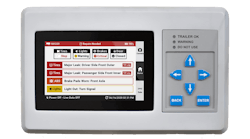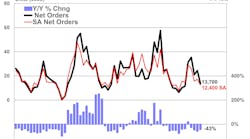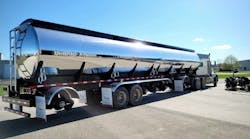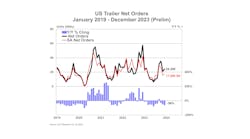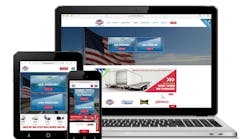It's tough offering a little something for everybody. Wal-Mart might be able to pull it off, but Wal-Mart isn't a trailer manufacturer — or a trailer dealer.
Max-Atlas, a container chassis manufacturer in St-Jean-sur-Richelieu, Quebec, Canada, used to sell trailers — representing several major U S and Canadian manufacturers. But a series of events led President Tibor Varga to conclude that his company's future was in manufacturing. And not just any type of product. And not just for any type of market. And not just in any geographic area — at least not yet.
The idea, clearly a valid one for most small and mid-sized companies, was to specialize. Today the company is strictly a container chassis manufacturer — a custom container chassis manufacturer.
“We used to represent Strick, Mond, and Monon,” Varga recalls. “But in 1986 customers began asking us to dabble in the container chassis market. At first we thought we wanted to generalize. But in 1996, we did a market study. We found that there was great potential in this market for someone who could innovate.”
Today Max-Atlas manufactures a couple of thousand containers annually — low volume by the standards of the world stage, but a decent level for a company that specializes in building what isn't necessarily available right now.
“We asked people what problems they face today in transportation,” Varga says. “We looked at Canada and analyzed the distance between cities. It seemed clear that we have load distribution problems that are different from other countries. Because of those distances, we need ways to transport a wide variety of goods. We went to work designing container chassis for multiple-use operations.”
From dealer to manufacturer
Varga credits several factors for his company's ability to transform itself from trailer dealer to container chassis manufacturer.
-
An ability to provide solutions. Engineering expertise, combined with the company's low-volume production, makes this possible. “This is really our biggest strength,” Varga says. Three-dimensional design software has helped Max-Atlas produce custom product in a brief period of time.
-
Delivery. Varga says the company makes it a point to promise only what it can deliver — and at the time promised. In a related item, Max-Atlas has been fine-tuning the ways it gets its container chassis to customers, particularly those on the other side of the continent from the Montreal area.
“We are learning how to ship,” Varga says. “I don't think anyone packages container chassis into containers for shipment to the customer like we do. All of our products are designed so that they can be containerized. That helps us economically ship our chassis all over Canada. We are preparing for entry into the global market.”
-
Understanding the market. In 1997, after careful study, the company became a manufacturer specializing strictly in container chassis. In 2002, the company narrowed its scope even further, limiting its marketing to Canada.
-
Aftermarket support. “We came out of the service side of the business,” Varga says. “As entrepreneurs, we have had to learn about manufacturing. But we know what it is like to serve the customer because we have been there.”
Learning to improve
Much of what Max-Atlas has learned about manufacturing comes from studying Toyota's lean production system.
“It's surprising how much of their system applies to small manufacturers,” Varga says. “We have been able to cut our lead time in everything we do, from order processing to delivery of the finished product.”
Max-Atlas hired a management consultant to help implement the system. Through his assistance, for example, management now sets production objectives for each day, with minute-by-minute monitoring of progress.
“Planning is more important than anything else,” Varga says. “Most companies don't plan enough. It's not just planning your production schedule. It's about looking at the entire operation.”
The results have been valuable. By using work teams, Max-Atlas has been able to increase output with reduced supervision.
“We have been able to reduce our costs substantially,” Varga says, “and we have become more efficient. We have been concentrating on becoming more profitable by doing things better. Only after we have improved our processes will we consider investing in automated equipment as a means of improving our production.”
The downturn that North America is experiencing has not caught Max-Atlas by surprise.
“The last five or six years have been very predictable,” Varga says. “That hasn't been the case this year. Business has been very strong in Canada,” Varga says. “But we have begun to slow after the U S slowed. Based on conversations we had with our customers and what industry experts were predicting, we expected a tough year in 2008. We made some financial decisions accordingly. We manage our finances very conservatively. To the extent possible, we operate on a cash basis. That helps keep us strong when a downturn occurs.”
Bright future
Beyond the current tight times, Varga believes there is a bright future for his dealer-turned-manufacturer company.
“We are still a fairly young manufacturer, just over a decade old,” he says. “Our objective has been to grow gradually and conservatively, getting our quality high and our production methods where they need to be. We have concentrated on producing one line of products — container chassis — for one sale in Canada. But we think that there is a global market for container chassis that are built to the specific needs of the customer, especially for one that offers a lot of hauling flexibility. We know that we can never complete with the companies that mass produce container chassis. But there is always room for someone who listens to the customer and who can tailor a product that meets his needs.”
